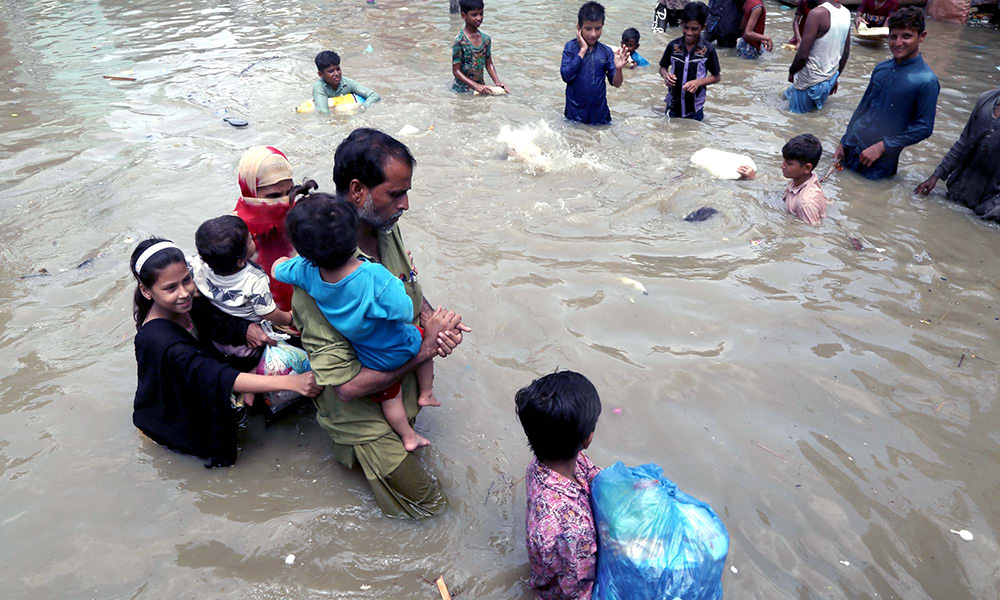World Bank commits to $2bn in aid for Pakistan reconstruction and rehabilitation efforts
Pakistan was recently impacted by devastating floods triggered by climate change-driven record rain fall

The World Bank has announced that it will provide US $2bn in aid to Pakistan, following the unprecedented floods that recently devastated the country. The financial institution said that the aid would be for reconstruction and rehabilitation, which includes food, shelter and other urgent needs of victims of the floods.
Record rain fall triggered severe flooding in Pakistan that, as per official data from the country, has killed over 1,600 people, and affected over 33m people since mid-June. Scientific analysis conducted by climate scientists across Pakistan, Europe and the United States revealed that climate change had a significant hand in causing the deadly floods.
National Disaster Management Authority (NDMA) officials said that the floods have caused about $40bn in losses.
The government of Pakistan has been calling for international aid due to scale of the disaster. Pakistani Prime Minister Shehbaz Sharif called the flooding “the worst in the history of Pakistan”, and pointed out that it would cost at least $10bn to repair damaged infrastructure across the country.

The announcement regarding the commitment of aid was made by the World Bank’s new Vice President for the South Asia region, Martin Raiser, following the conclusion of his tour of the country.
“As an immediate response, we are repurposing funds from existing World Bank-financed projects to support urgent needs in health, food, shelter, rehabilitation, and cash transfers,” the World Bank statement explained.
Initially, the World Bank had agreed to provide $850mn for flood relief on the back of a meeting with Pakistan’s Prime Minister Shehbaz Sharif on the sidelines of the UN General Assembly in New York. The amount has now been increased to $2bn, the statement said.
Raiser commented, “We are deeply saddened by the loss of lives and livelihoods due to the devastating floods and we are working with the federal and provincial governments to provide immediate relief to those who are most affected.”

In the wake of the disastrous floods, countries and other international institutions have been mobilising support for victims in the country. Towards the end of August, the United Nations launched a $160mn flash appeal for immediate relief of the victims.
On 1 September, Sheikh Mohammed bin Rashid, Vice President and Ruler of Dubai, ordered aid worth $13.6mn delivered to Pakistan. The food aid was provided by the Mohammed bin Rashid Al Maktoum Global Initiatives, in co-operation with the World Food Programme and the Mohammed bin Rashid Al Maktoum Humanitarian and Charity Establishment. Humanitarian organisations in the UAE have also been calling for relief kits for affected families in Pakistan.
In early September, UNESCO also announced that it has mobilised an emergency amount of $350,000 to help recover flood-damaged cultural heritage sites in the country. The organisation said it is also working in the field of education to quickly provide distance learning solutions.
“First of all, our thoughts are with the families who have lost a loved one, the injured, all those who have been forced to leave their homes and with the authorities. UNESCO stands with them,” said Audrey Azoulay, UNESCO Director-General.

The UNESCO statement added that cultural heritage has also been damaged by the floods, including the UNESCO World Heritage sites ‘Archaeological Ruins at Moenjodaro’ and ‘Historical Monuments at Makli, Thatta’. Karez in Balochistan, a traditional irrigation system on Pakistan’s World Heritage Tentative List, the Amri site museum and the Sehwan folk and craft museum, both in the Jamshoro District, have also been reported as damaged by the recent floods.
It added that cultural practices, such as crafts and music, which are often an important source of income, have also been severely disrupted. UNESCO’s activities will aim to support not only the national response plans but also the knowledge bearers, artisans, crafts people and artists who have lost their livelihoods due to the floods on the other, the statement noted.

























